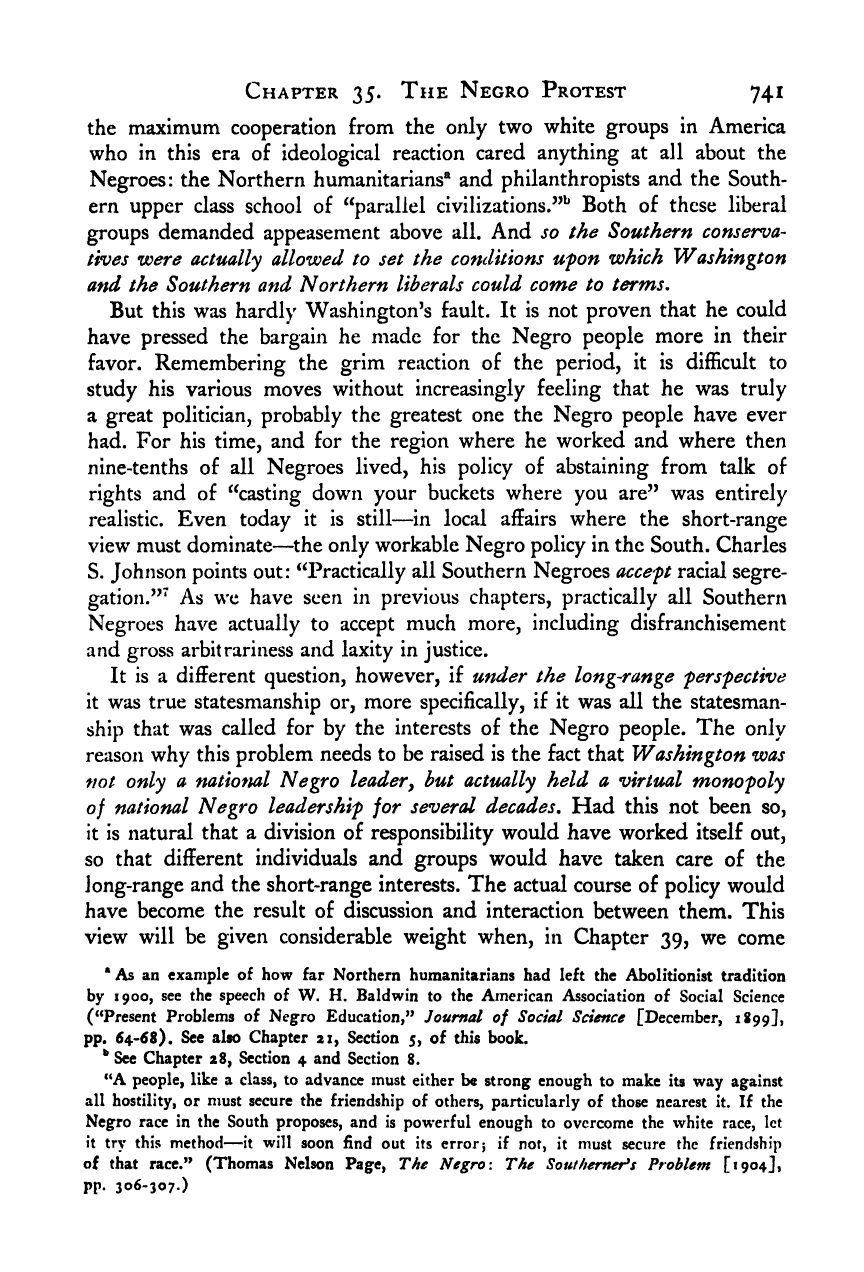Note: Gunnar Myrdal died in 1987, less than 70 years ago. Therefore, this work is protected by copyright, restricting your legal rights to reproduce it. However, you are welcome to view it on screen, as you do now. Read more about copyright.
Full resolution (TIFF) - On this page / på denna sida - IX. Leadership and Concerted Action - 35. The Negro Protest - 3. The Tuskegee Compromise

<< prev. page << föreg. sida << >> nästa sida >> next page >>
Below is the raw OCR text
from the above scanned image.
Do you see an error? Proofread the page now!
Här nedan syns maskintolkade texten från faksimilbilden ovan.
Ser du något fel? Korrekturläs sidan nu!
This page has never been proofread. / Denna sida har aldrig korrekturlästs.
Chapter 35. The Negro Protest 741
the maximum cooperation from the only two white groups in America
who in this era of ideological reaction cared anything at all about the
Negroes: the Northern humanitarians® and philanthropists and the South-
ern upper class school of “parallel civilizations.”^ Both of these liberal
groups demanded appeasement above all. And so the Southern conserva-
tives were actually allowed to set the conditions ufon which Washington
and the Southern and Northern liberals could come to terms.
But this was hardly Washington’s fault. It is not proven that he could
have pressed the bargain he made for the Negro people more in their
favor. Remembering the grim reaction of the period, it is difficult to
study his various moves without increasingly feeling that he was truly
a great politician, probably the greatest one the Negro people have ever
had. For his time, and for the region where he worked and where then
nine-tenths of all Negroes lived, his policy of abstaining from talk of
rights and of “casting down your buckets where you are” was entirely
realistic. Even today it is still—in local affairs where the short-range
view must dominate—the only workable Negro policy in the South. Charles
S. Johnson points out: “Practically all Southern Negroes accent racial segre-
gation.”* As we have seen in previous chapters, practically all Southern
Negroes have actually to accept much more, including disfranchisement
and gross arbitrariness and laxity in justice.
It is a different question, however, if under the long-range fersfective
it was true statesmanship or, more specifically, if it was all the statesman-
ship that was called for by the interests of the Negro people. The only
reason why this problem needs to be raised is the fact that Washington was
not only a natioml Negro leader, but actually held a virtual monopoly
of national Negro leadership for several decades. Had this not been so,
it is natural that a division of responsibility would have worked itself out,
so that different individuals and groups would have taken care of the
long-range and the short-range interests. The actual course of policy would
have become the result of discussion and interaction between them. This
view will be given considerable weight when, in Chapter 39, we come
* As an example of how far Northern humanitarians had left the Abolitionist tradition
by 1900, see the speech of W. H. Baldwin to the American Association of Social Science
(“Present Problems of Neg-ro Education,” Journal of Social Science [December, 1899],
pp. 64-68). See also Chapter 21, Section 5, of this book.
**
See Chapter 28, Section 4 and Section 8.
“A people, like a class, to advance must either be strong enough to make its way against
all hostility, or must secure the friendship of others, particularly of those nearest it. If the
Negro race in the South proposes, and is pow^erful enough to overcome the white race, let
it try this method—it will soon find out its error; if not, it must secure the friendship
of that race.” (Thomas Nelson Page, The Negro: The Southerner’s Problem [1904],
pp. 306-307.)
<< prev. page << föreg. sida << >> nästa sida >> next page >>